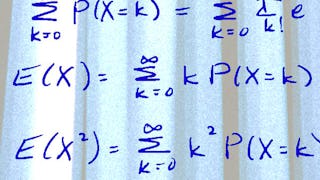This course introduces the theoretical, philosophical, and mathematical foundations of Bayesian Statistical inference. Students will learn to apply this foundational knowledge to real-world data science problems. Topics include the use and interpretations of probability theory in Bayesian inference; Bayes’ theorem for statistical parameters; conjugate, improper, and objective priors distributions; data science applications of Bayesian inference; and ethical implications of Bayesian statistics.

Bringen Sie Ihre Karriere in diesem Sommer in Schwung mit Kursen von Google, IBM und anderen für £190/Jahr. Jetzt sparen.


Empfohlene Erfahrung
Was Sie lernen werden
Implement Bayesian inference to solve real-world statistics and data science problems.
Articulate the logic of Bayesian inference and compare and contrast it with frequentist inference.
Utilize conjugate, improper, and objective priors to find posterior distributions.
Kompetenzen, die Sie erwerben
- Kategorie: Statistical Inference
- Kategorie: Data Ethics
- Kategorie: Bayesian Statistics
- Kategorie: Probability
- Kategorie: Predictive Analytics
- Kategorie: Statistical Methods
- Kategorie: Statistical Modeling
- Kategorie: Regression Analysis
- Kategorie: Probability Distribution
- Kategorie: Data Science
- Kategorie: Analytical Skills
Wichtige Details

Zu Ihrem LinkedIn-Profil hinzufügen
Mai 2025
5 Aufgaben
Erfahren Sie, wie Mitarbeiter führender Unternehmen gefragte Kompetenzen erwerben.

In diesem Kurs gibt es 5 Module
This module introduces learners to Bayesian statistics by comparing Bayesian and frequentist methods. The introduction is motivated by an example that illustrates how different assumptions about data collection - specifically, stopping rules - can result in different conclusions when using frequentist methods. Bayesian methods, on the other hand, yield the same conclusion regardless of stopping rules. This example illuminates a key philosophical difference between frequentist and Bayesian methods.
Das ist alles enthalten
8 Videos4 Lektüren1 Aufgabe3 Programmieraufgaben1 Diskussionsthema2 Unbewertete Labore
This module introduces learners to Bayesian inference through an example using discrete data. The example demonstrates how the posterior distribution is calculated and how uncertainty is quantified in Bayesian statistics. The module also describes methods for summarizing the posterior distribution and introduces learners to the posterior predictive distribution through use of the Monte Carlo simulation. Monte Carlo simulations will be important for advanced computational Bayesian methods.
Das ist alles enthalten
6 Videos1 Aufgabe1 Programmieraufgabe2 Unbewertete Labore
This module introduces learners to methods for conducting Bayesian inference when the likelihood and prior distributions come from a convenient family of distributions, called conjugate families. Conjugate families are a class of prior distributions for which the posterior distribution is in the same class. The module covers the beta-binomial, normal-normal and inverse gamma-normal conjugate families and includes examples of their application to find posterior distributions in R.
Das ist alles enthalten
7 Videos1 Lektüre1 Aufgabe1 Programmieraufgabe2 Unbewertete Labore
This module motivates, defines, and utilizes improper and so-called "objective" prior distributions in Bayesian statistical inference.
Das ist alles enthalten
7 Videos1 Lektüre1 Aufgabe1 Programmieraufgabe2 Unbewertete Labore
In this module, learners will be introduced to Bayesian inference involving more than one unknown parameter. Multiparameter problems are motivated with a simple example: a conjugate prior, two-parameter model involving normally distributed data. From there, we learn to solve more complex problems, including Bayesian linear regression and variance-covariance matrix estimation.
Das ist alles enthalten
9 Videos1 Lektüre1 Aufgabe1 Programmieraufgabe3 Unbewertete Labore
Erwerben Sie ein Karrierezertifikat.
Fügen Sie dieses Zeugnis Ihrem LinkedIn-Profil, Lebenslauf oder CV hinzu. Teilen Sie sie in Social Media und in Ihrer Leistungsbeurteilung.
Dozent

Mehr von Probability and Statistics entdecken
 Status: Kostenloser Testzeitraum
Status: Kostenloser TestzeitraumUniversity of Colorado Boulder
 Status: Kostenloser Testzeitraum
Status: Kostenloser TestzeitraumUniversity of Colorado Boulder
 Status: Kostenloser Testzeitraum
Status: Kostenloser TestzeitraumUniversity of Colorado Boulder

Duke University
Warum entscheiden sich Menschen für Coursera für ihre Karriere?





Neue Karrieremöglichkeiten mit Coursera Plus
Unbegrenzter Zugang zu 10,000+ Weltklasse-Kursen, praktischen Projekten und berufsqualifizierenden Zertifikatsprogrammen - alles in Ihrem Abonnement enthalten
Bringen Sie Ihre Karriere mit einem Online-Abschluss voran.
Erwerben Sie einen Abschluss von erstklassigen Universitäten – 100 % online
Schließen Sie sich mehr als 3.400 Unternehmen in aller Welt an, die sich für Coursera for Business entschieden haben.
Schulen Sie Ihre Mitarbeiter*innen, um sich in der digitalen Wirtschaft zu behaupten.
Häufig gestellte Fragen
Access to lectures and assignments depends on your type of enrollment. If you take a course in audit mode, you will be able to see most course materials for free. To access graded assignments and to earn a Certificate, you will need to purchase the Certificate experience, during or after your audit. If you don't see the audit option:
The course may not offer an audit option. You can try a Free Trial instead, or apply for Financial Aid.
The course may offer 'Full Course, No Certificate' instead. This option lets you see all course materials, submit required assessments, and get a final grade. This also means that you will not be able to purchase a Certificate experience.
When you enroll in the course, you get access to all of the courses in the Specialization, and you earn a certificate when you complete the work. Your electronic Certificate will be added to your Accomplishments page - from there, you can print your Certificate or add it to your LinkedIn profile. If you only want to read and view the course content, you can audit the course for free.
If you subscribed, you get a 7-day free trial during which you can cancel at no penalty. After that, we don’t give refunds, but you can cancel your subscription at any time. See our full refund policy.
Weitere Fragen
Finanzielle Unterstützung verfügbar,
 enthalten
enthalten
